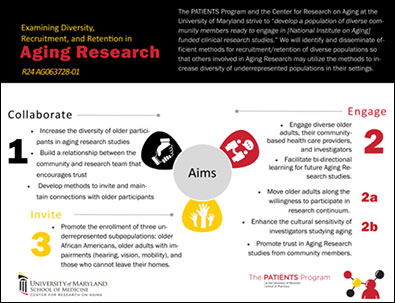The NIA R24 Initiative: Building Trust to Enhance Diversity in Aging Research (R24 AG063728-01) aims to reduce health disparities among diverse groups of older adults through work with community allies.
This project will help address barriers that can prevent elderly residents from taking part in health research.
 Project Aims:
Project Aims:
- First Aim: Create a partnership between the community and research team that builds trust, invites older residents to engage in research and maintain relationships with them, and increase diversity in studies of aging.
- Second Aim: Help older people, their doctors, and researchers learn from each other.
- Help older people be comfortable being in research.
- Help researchers earn the trust of older people they study.
- Third Aim: Encourage older adults to join research studies using ethical methods. Focus our efforts on the following groups:
- Older African Americans
- Older adults with impairments (hearing, vision, mobility)
- Those who cannot leave their homes
Future Objectives: Create a database that includes older and underrepresented community members by inviting older residents to engage in research and maintain relationships with them. Have researchers and older residents learn from each other to reduce current health disparities and prioritize the most important healthcare topics for the community.
Project Team:
The Center for Research on Aging
The Center for Research on Aging was established in 1998 under the leadership of Andrew P. Goldberg, MD, and Jay S. Magaziner, PhD, MSHyg. Dr. Magaziner assumed sole leadership of the Center in 2015, when Dr. Goldberg retired from the University of Maryland. The center coordinates research and research training in those areas of gerontology that transcend traditional disciplinary lines and are amenable to an interdisciplinary approach to critical issues in aging research. It interfaces with the University's existing efforts in gerontology and geriatric medicine to develop research, educational and clinical programs that nurture and expand research and research funding in aging. Since assuming leadership of the center in 2015, Dr. Magaziner has continued to shape the center's directions and sucessfully expanded membership to 134 affiliates including 20 leaders from all schools across campus and UMBC.
The PATIENTS Program
The PATIENTS Program envisions a world in which patients and stakeholders are heard, inspired, and empowered to co-develop patient-centered outcomes research (PCOR). The PATIENTS Program partners with patients and care providers to answer questions about the best treatment options to improve health and quality of life. We engage people from all communities, especially those from underserved and minority populations, in every step of the patient-centered outcomes research (PCOR) process. Through our collective efforts, we create an effective learning health care community.
- We listen to our patients’ voices so that we ask relevant and meaningful questions.
- We align research priorities with the values of patients and communities.
- We transform research to make it more relevant and patient-centered.
- We train patients, stakeholders, and researchers to become co-developers of PCOR.
Project Updates:
For the latest updates on the NIA R24 Initiative: Building Trust to Enhance Diversity in Aging Research project, please explore the links below:
